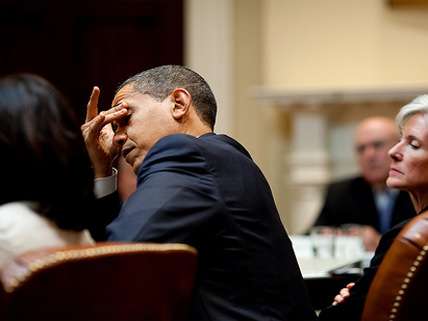Does Obama Have the Lawful Power to Keep Delaying Obamacare?

As Peter Suderman noted this morning, President Barack Obama has once again delayed implementation of the Patient Protection and Affordable Care Act's mandate requiring businesses that employ more than 50 workers to provide qualifying health insurance to their employees. This unilateral executive action raises all sorts of questions, but underlying them all is a basic matter of law: Does the president posses the legitimate authority to keep kicking this can down the road?
There's some reason to think he does not. As University of Michigan law professor Nicholas Bagley argued back in July when the president announced his first implementation delay of the employer mandate:
In a letter and in congressional testimony, the administration has invoked a general statutory provision authorizing the IRS to "prescribe all needful rules and regulations" for enforcing the tax code. That rulemaking power, in the administration's view, allows it to delay the effective dates of tax statutes in narrow circumstances.
But is that right? For support, the administration points to a practice dating back to at least 2000 of providing "transition relief" for new tax legislation "when [its] immediate application would have subjected taxpayers to unreasonable administrative burdens or costs."…
In pointing to past practice, administration officials are tacitly arguing that it may act consistently with that practice until either Congress or the courts say otherwise. This is the kind of argument the executive branch makes all the time. As the administration sees it, the IRS has been saying, "Hey, Congress, we think you've given us the power to temporarily delay tax statutes where implementing them is really hard. Let us know if we're wrong." In declining to clip the IRS's wings, Congress has acceded to that view. (My kids make this kind of argument all the time. When I tell my son to stop jumping on the couch, he's apt to say that he's jumped on it before. For him, my earlier failure to tell him to stop means that there's no rule against jumping on the couch.)
Here's another way to think about whether Obama has the discretion to keep departing from the letter of the law. As Georgetown law professor Randy Barnett put it, "tell me again why a future Republican administration can't just waive Obamacare."
Update: At the Volokh Conspiracy, Case Western Reserve law professor Jonathan Adler pulls no punches:
Whatever the stated reason for the new delay, it is illegal. The text of the PPACA is quite clear. The text of the Patient Protection and Affordable Care Act provides that the employer mandate provisions "shall apply" after December 31, 2013. The Treasury Department claims that it has broad authority to offer "transition relief" in implementing the law. That may often be true, but not here. The language of the statute is clear, and it is well established that when Congress enacts explicit deadlines into federal statutes, without also providing authority to waive or delay such deadlines, federal agencies are obligated to stay on schedule. So, for instance, federal courts routinely force the Environmental Protection Agency to act when it misses deadlines and environmentalist groups file suit.


Show Comments (109)